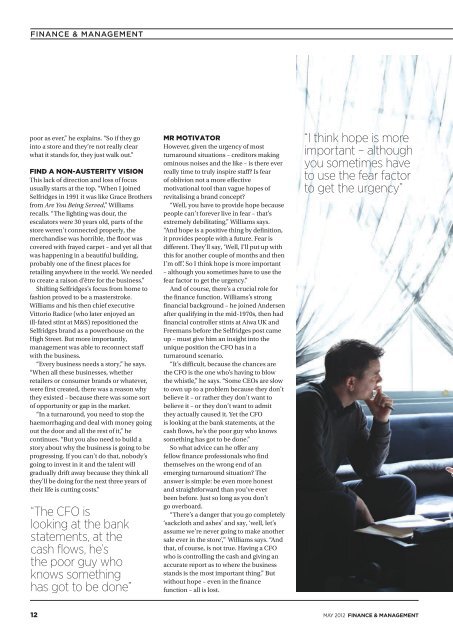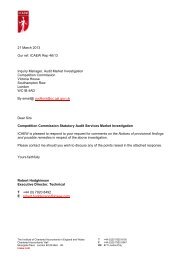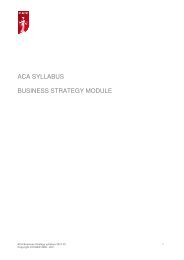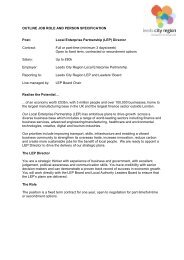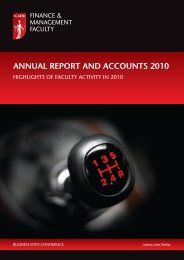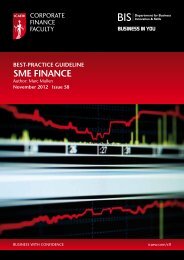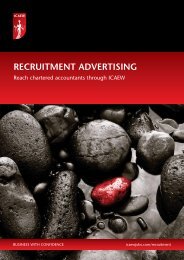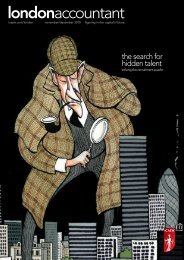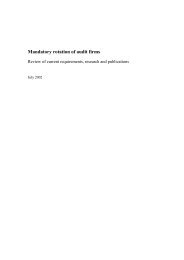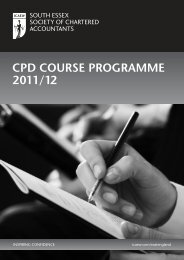Hit the road Positive leadership for troubled times - ICAEW
Hit the road Positive leadership for troubled times - ICAEW
Hit the road Positive leadership for troubled times - ICAEW
You also want an ePaper? Increase the reach of your titles
YUMPU automatically turns print PDFs into web optimized ePapers that Google loves.
FINANCE & MANAGEMENT<br />
poor as ever,” he explains. “So if <strong>the</strong>y go<br />
into a store and <strong>the</strong>y’re not really clear<br />
what it stands <strong>for</strong>, <strong>the</strong>y just walk out.”<br />
FIND A NON-AUSTERITY VISION<br />
This lack of direction and loss of focus<br />
usually starts at <strong>the</strong> top. “When I joined<br />
Selfridges in 1991 it was like Grace Bro<strong>the</strong>rs<br />
from Are You Being Served,” Williams<br />
recalls. “The lighting was dour, <strong>the</strong><br />
escalators were 30 years old, parts of <strong>the</strong><br />
store weren’t connected properly, <strong>the</strong><br />
merchandise was horrible, <strong>the</strong> floor was<br />
covered with frayed carpet – and yet all that<br />
was happening in a beautiful building,<br />
probably one of <strong>the</strong> finest places <strong>for</strong><br />
retailing anywhere in <strong>the</strong> world. We needed<br />
to create a raison d’être <strong>for</strong> <strong>the</strong> business.”<br />
Shifting Selfridges’s focus from home to<br />
fashion proved to be a masterstroke.<br />
Williams and his <strong>the</strong>n chief executive<br />
Vittorio Radice (who later enjoyed an<br />
ill-fated stint at M&S) repositioned <strong>the</strong><br />
Selfridges brand as a powerhouse on <strong>the</strong><br />
High Street. But more importantly,<br />
management was able to reconnect staff<br />
with <strong>the</strong> business.<br />
“Every business needs a story,” he says.<br />
“When all <strong>the</strong>se businesses, whe<strong>the</strong>r<br />
retailers or consumer brands or whatever,<br />
were first created, <strong>the</strong>re was a reason why<br />
<strong>the</strong>y existed – because <strong>the</strong>re was some sort<br />
of opportunity or gap in <strong>the</strong> market.<br />
“In a turnaround, you need to stop <strong>the</strong><br />
haemorrhaging and deal with money going<br />
out <strong>the</strong> door and all <strong>the</strong> rest of it,” he<br />
continues. “But you also need to build a<br />
story about why <strong>the</strong> business is going to be<br />
progressing. If you can’t do that, nobody’s<br />
going to invest in it and <strong>the</strong> talent will<br />
gradually drift away because <strong>the</strong>y think all<br />
<strong>the</strong>y’ll be doing <strong>for</strong> <strong>the</strong> next three years of<br />
<strong>the</strong>ir life is cutting costs.”<br />
“The CFO is<br />
looking at <strong>the</strong> bank<br />
statements, at <strong>the</strong><br />
cash flows, he’s<br />
<strong>the</strong> poor guy who<br />
knows something<br />
has got to be done”<br />
MR MOTIVATOR<br />
However, given <strong>the</strong> urgency of most<br />
turnaround situations – creditors making<br />
ominous noises and <strong>the</strong> like – is <strong>the</strong>re ever<br />
really time to truly inspire staff? Is fear<br />
of oblivion not a more effective<br />
motivational tool than vague hopes of<br />
revitalising a brand concept?<br />
“Well, you have to provide hope because<br />
people can’t <strong>for</strong>ever live in fear – that’s<br />
extremely debilitating,” Williams says.<br />
“And hope is a positive thing by definition,<br />
it provides people with a future. Fear is<br />
different. They’ll say, ‘Well, I’ll put up with<br />
this <strong>for</strong> ano<strong>the</strong>r couple of months and <strong>the</strong>n<br />
I’m off’. So I think hope is more important<br />
– although you some<strong>times</strong> have to use <strong>the</strong><br />
fear factor to get <strong>the</strong> urgency.”<br />
And of course, <strong>the</strong>re’s a crucial role <strong>for</strong><br />
<strong>the</strong> finance function. Williams’s strong<br />
financial background – he joined Andersen<br />
after qualifying in <strong>the</strong> mid-1970s, <strong>the</strong>n had<br />
financial controller stints at Aiwa UK and<br />
Freemans be<strong>for</strong>e <strong>the</strong> Selfridges post came<br />
up – must give him an insight into <strong>the</strong><br />
unique position <strong>the</strong> CFO has in a<br />
turnaround scenario.<br />
“It’s difficult, because <strong>the</strong> chances are<br />
<strong>the</strong> CFO is <strong>the</strong> one who’s having to blow<br />
<strong>the</strong> whistle,” he says. “Some CEOs are slow<br />
to own up to a problem because <strong>the</strong>y don’t<br />
believe it – or ra<strong>the</strong>r <strong>the</strong>y don’t want to<br />
believe it – or <strong>the</strong>y don’t want to admit<br />
<strong>the</strong>y actually caused it. Yet <strong>the</strong> CFO<br />
is looking at <strong>the</strong> bank statements, at <strong>the</strong><br />
cash flows, he’s <strong>the</strong> poor guy who knows<br />
something has got to be done.”<br />
So what advice can he offer any<br />
fellow finance professionals who find<br />
<strong>the</strong>mselves on <strong>the</strong> wrong end of an<br />
emerging turnaround situation? The<br />
answer is simple: be even more honest<br />
and straight<strong>for</strong>ward than you’ve ever<br />
been be<strong>for</strong>e. Just so long as you don’t<br />
go overboard.<br />
“There’s a danger that you go completely<br />
‘sackcloth and ashes’ and say, ‘well, let’s<br />
assume we’re never going to make ano<strong>the</strong>r<br />
sale ever in <strong>the</strong> store’,” Williams says. “And<br />
that, of course, is not true. Having a CFO<br />
who is controlling <strong>the</strong> cash and giving an<br />
accurate report as to where <strong>the</strong> business<br />
stands is <strong>the</strong> most important thing.” But<br />
without hope – even in <strong>the</strong> finance<br />
function – all is lost.<br />
“I think hope is more<br />
important – although<br />
you some<strong>times</strong> have<br />
to use <strong>the</strong> fear factor<br />
to get <strong>the</strong> urgency”<br />
12<br />
MAY 2012 FINANCE & MANAGEMENT


